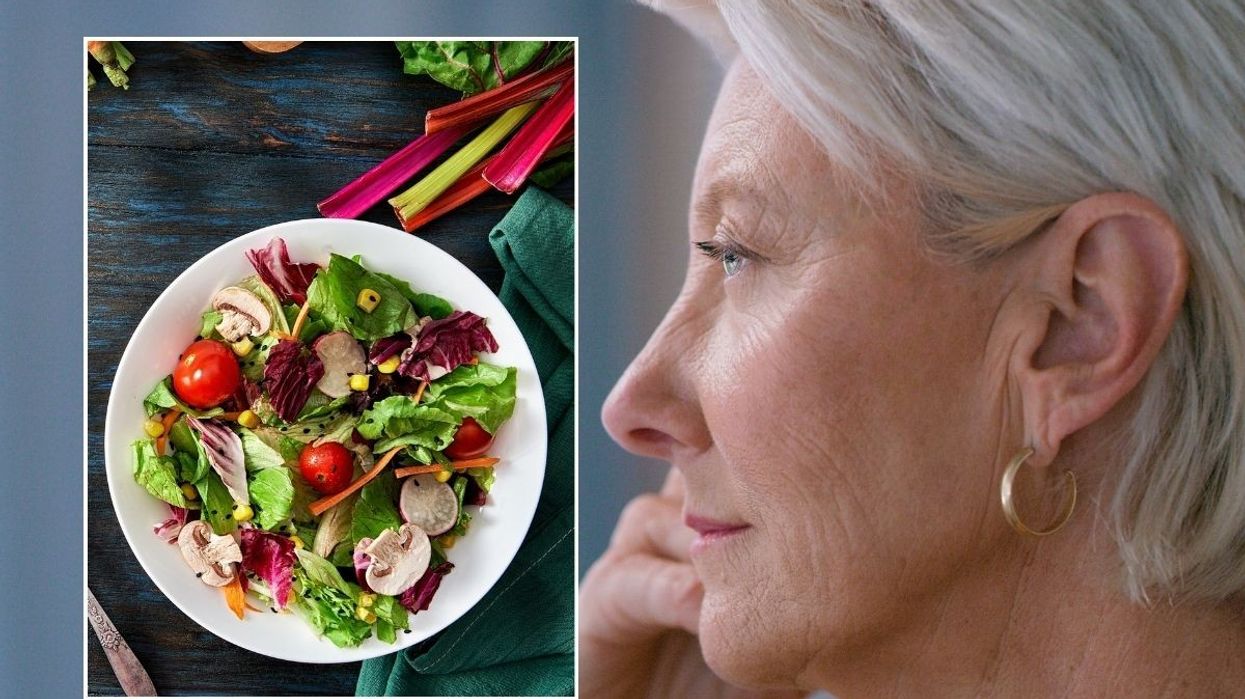Best recipe for menopause: Combat ‘belly fat’, thin hair and saggy skin for women - ingredients and method

Women over 50 can tackle most menopause side effects by eating the right foods
|GETTY

Nothing helps with menopause more than HRT, but shunning the right foods will exasperate complications like poor weight management, saggy skin and brittle hair, according to experts. GB News has looked at the best foods for menopause
Don't Miss
Most Read
When women enter menopause, many watch as fat moves from their thighs and hips to the mid-section of their abdomen. The transition period also brings noticeable changes to their skin and hair. Naturally, their lives suffer as a result.
Because dysregulation of hormones is at the core of these problems, the focus should be on striving to re-establish a balance so the side effects dissipate.
The advice to address these issues tends to be consistent across different medical circles; be physically active, get plenty of rest and eat a high-quality diet rich in minimally processed foods that keep you (and your gut) healthy.
To shed light on the dietary tools available, GB News sourced a science-baked formula to help combat menopause complications.
Abbas Kanani, an expert at Chemist Click, told GB News just how crucial diet becomes during a person's golden years.
“Diet plays an important role for women in their 50s and eating well can help them prevent many health problems, reduce the severity of symptoms and support good overall health," the expert explained.
The Mediterranean diet is a top contender among natural treatments because it encompasses all the nutrients a woman needs for hormonal balance.
“The diet is [...] made up of vegetables, fruits, nuts, beans and whole grains and moderate amounts of seafood, dairy and eggs," Abbas explained.

The Mediterranean diet encompasses all the nutrients women need to combat weight gain during menopause
| Getty Images“It offers rich anti-inflammatory properties and helps to limit intake of saturated fat and trans fat, which is ideal for weight balance and managing belly fat.
“This is particularly beneficial to older women because lower levels of oestrogen after menopause can lead to fat being stored around your waist rather than on your hits and thighs.”
The best foods for healthy skin and hair in women over 50:
When asked about the nutrients that could support healthier nails and skin in women, Abbas responded: “Nutrients found in specific foods can help with the appearance of skin and hair.”
Omega-3 acids found in fatty fish like salmon, mackerel, tuna, herring and sardines are necessary to help keep skin feeling supple and moisturised.
Additionally, there is proof vitamin C helps neutralise the free radicals in our body that lead to oxidative stress, therefore, eating hydrating citrus fruits which are high in vitamin C such as oranges and grapefruit could fight wrinkles, and premature skin ageing and promote healthy skin.
“Leafy green vegetables like kale, broccoli and spinach are packed with disease-fighting chlorophyll which protects against free radicals that can lead to ageing skin and are a good source of zinc and vitamin A which are essential for healthy hair and nails."
Can menopause symptoms be delayed?
You can’t prevent symptoms of menopause, however, you can take steps to enjoy good health as you age. Adopting suitable dietary habits early enough may even offset the transition period.
“Some evidence suggests that a high intake of fruits and vegetables may delay the onset of menopause and prolong the reproductive lifespan because of the presence of antioxidants, which counteract the adverse effects of reactive oxygen species on the number and quality of ovarian follicles," explained Abbas.
It is the drop in oestrogen levels that causes most of the symptoms of menopause. Certain foods such as flaxseeds, soy and other legumes can help to boost levels naturally.
“It is also suggested that eating yoghurt during the menopausal transition could help prevent gaining weight," added the expert.
“Ultimately, eating well, exercising and looking after your mental well-being can all contribute to helping with symptoms during perimenopause and menopause."
The importance of phytoestrogens
A diet rich in phytoestrogens may help combat many of the complications associated with menopause, explaining why women in East Asia suffer less.
Lizzie Hennig, BaxterStorey’s nutritionist, encourages upping the intake of these compounds to cushion the sharp drop in oestrogen experienced during menopause.
“Consume more phytoestrogens, which are found in foods like chickpeas, peanuts, grains, kale, broccoli, berries and apples," she said.
"These compounds have an oestrogen-like effect and can help manage menopause symptoms.”
Sharing additional pearls of wisdom, Lizzie explained why certain foods should be upped to mitigate unwanted hunger pangs.
“To control carb cravings, prioritise a diet rich in whole foods with fibre and avoid ultra-processed foods," she said.
"Always opt for wholegrain as they are higher in fibre and lower in sugar, which helps to stabilise blood sugar levels and prevent sugar spikes that lead to cravings."
Menopause lunch/dinner recipe
Registered Nutritional Therapist Sally Duffi offers the following recipe for protection against menopause complications like weight gain, thinning hair and dull skin.
The easy-to-adapt formula outlines the ratios to follo using ingredients most people already have in their fridge.
“Try this Buddha bowl recipe that combines foods rich in phytoestrogens to help support hormone balance during perimenopause and menopause," she noted.
“A Buddha bowl is colourful, satisfying, and flexible to make - just mix and match the ingredients according to what you fancy and what’s in the fridge.”
Ingredients
Choose one to three ingredients from each category to make a Buddha bowl:
Protein - fill ¼ of your bowl:
- Chickpeas
- Houmous
- Tofu or tempeh
- Sprouted mung beans
- Sesame seeds
- Cashew nuts
- Ground flaxseed
- Meat or fish
- Hard-boiled eggs
- Kidney beans
- Quinoa
- Lentils
- Carbohydrates
- Cooked brown rice
- Baked sweet potato
- Wholewheat pasta
- Buckwheat
Starchy root vegetables:
- Beetroot
- Carrot
- Parsnip
Colourful vegetables - fill ½ of your bowl:
- Broccoli
- Green beans
- Red cabbage
- Tomato
- Courgette
- Aubergine
- Cucumber
- Peppers
- Sweetcorn
Method
Drizzle a generous dressing of lemon juice, olive oil or avocado oil, apple cider vinegar and black pepper or your Buddha bowl, adding fresh herbs to taste.

Omega-3s promote healthy hair, skin and weight in women over 50
| GETTYThe rule of thumb for menopause diets
Caroline Hind, Registered Nutritionist at Nutrable, drives home the importance for women in their fifties to balance hormones. Boosting mental health and emphasising muscle mass are equally important, however.
“It’s the time to get the most out of the nutrition by taking a good look at what you’re eating and being ruthless with what should stay and what should go," she explained.
Generally, a good diet at this time of life should include a high level of protein and a rainbow of colours.
“Those bright colours of peppers, carrots and leafy greens are full of antioxidants to support brain function and healthy ageing," said Caroline.
“Whether it’s meat, fish and eggs or tofu, buts and dairy, protein-rich foods provide bones and muscles with the building blocks they need to stay strong.
“Remember, muscle mass is lost every decade of our lives and post-menopause, bone density is no longer protected by oestrogen."
The two foods to discard are sugar treats as they accelerate signs of ageing. Swapping these out for better quality foods like dark chocolate will help satiate cravings.
“When the body is undergoing major changes, the last thing it needs is food that promotes inflammation and gets in the way of its own healing process," the expert explained.










